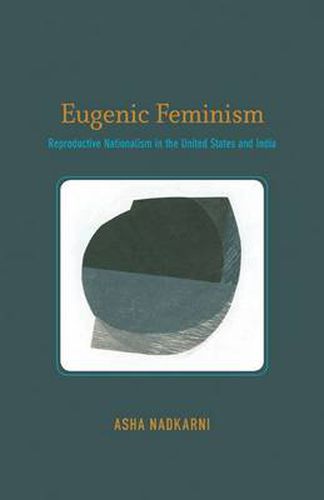Readings Newsletter
Become a Readings Member to make your shopping experience even easier.
Sign in or sign up for free!
You’re not far away from qualifying for FREE standard shipping within Australia
You’ve qualified for FREE standard shipping within Australia
The cart is loading…






Asha Nadkarni contends that whenever feminists lay claim to citizenship based on women’s biological ability to reproduce the nation they are participating in a eugenic project–sanctioning reproduction by some and prohibiting it by others. Employing a wide range of sources from the United States and India, Nadkarni shows how the exclusionary impulse of eugenics is embedded within the terms of nationalist feminism.
Nadkarni reveals connections between U.S. and Indian nationalist feminisms from the late nineteenth century through the 1970s, demonstrating that both call for feminist citizenship centered on the reproductive body as the origin of the nation. She juxtaposes U.S. and Indian feminists (and antifeminists) in provocative and productive ways: Charlotte Perkins Gilman’s utopian novels regard eugenic reproduction as a vital form of national production; Sarojini Naidu’s political speeches and poetry posit liberated Indian women as active agents of a nationalist and feminist modernity predating that of the West; and Katherine Mayo’s 1927 Mother India warns white U.S. women that Indian reproduction is a world menace. In addition, Nadkarni traces the refashioning of the icon Mother India, first in Mehboob Khan’s 1957 film Mother India and Kamala Markandaya’s 1954 novel Nectar in a Sieve, and later in Indira Gandhi’s self-fashioning as Mother India during the Emergency from 1975 to 1977.
By uncovering an understudied history of feminist interactivity between the United States and India, Eugenic Feminism brings new depth both to our understanding of the complicated relationship between the two nations and to contemporary feminism.
$9.00 standard shipping within Australia
FREE standard shipping within Australia for orders over $100.00
Express & International shipping calculated at checkout
Asha Nadkarni contends that whenever feminists lay claim to citizenship based on women’s biological ability to reproduce the nation they are participating in a eugenic project–sanctioning reproduction by some and prohibiting it by others. Employing a wide range of sources from the United States and India, Nadkarni shows how the exclusionary impulse of eugenics is embedded within the terms of nationalist feminism.
Nadkarni reveals connections between U.S. and Indian nationalist feminisms from the late nineteenth century through the 1970s, demonstrating that both call for feminist citizenship centered on the reproductive body as the origin of the nation. She juxtaposes U.S. and Indian feminists (and antifeminists) in provocative and productive ways: Charlotte Perkins Gilman’s utopian novels regard eugenic reproduction as a vital form of national production; Sarojini Naidu’s political speeches and poetry posit liberated Indian women as active agents of a nationalist and feminist modernity predating that of the West; and Katherine Mayo’s 1927 Mother India warns white U.S. women that Indian reproduction is a world menace. In addition, Nadkarni traces the refashioning of the icon Mother India, first in Mehboob Khan’s 1957 film Mother India and Kamala Markandaya’s 1954 novel Nectar in a Sieve, and later in Indira Gandhi’s self-fashioning as Mother India during the Emergency from 1975 to 1977.
By uncovering an understudied history of feminist interactivity between the United States and India, Eugenic Feminism brings new depth both to our understanding of the complicated relationship between the two nations and to contemporary feminism.